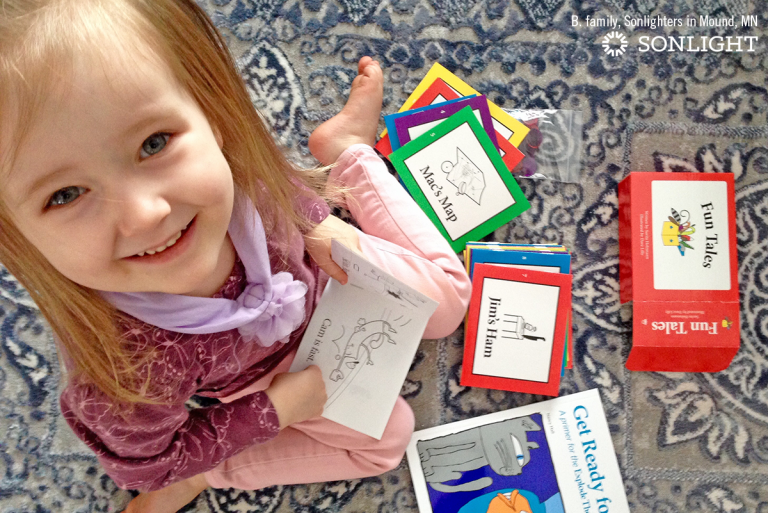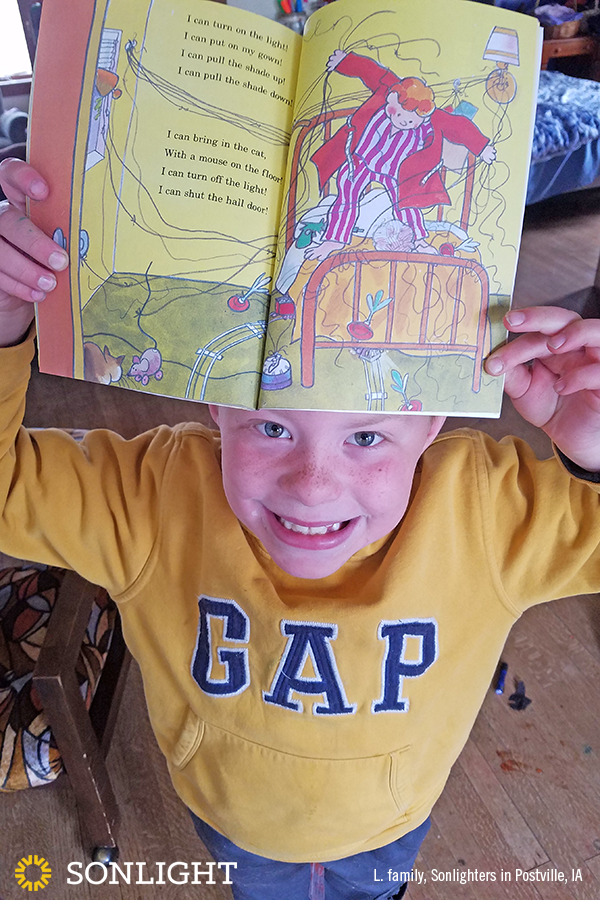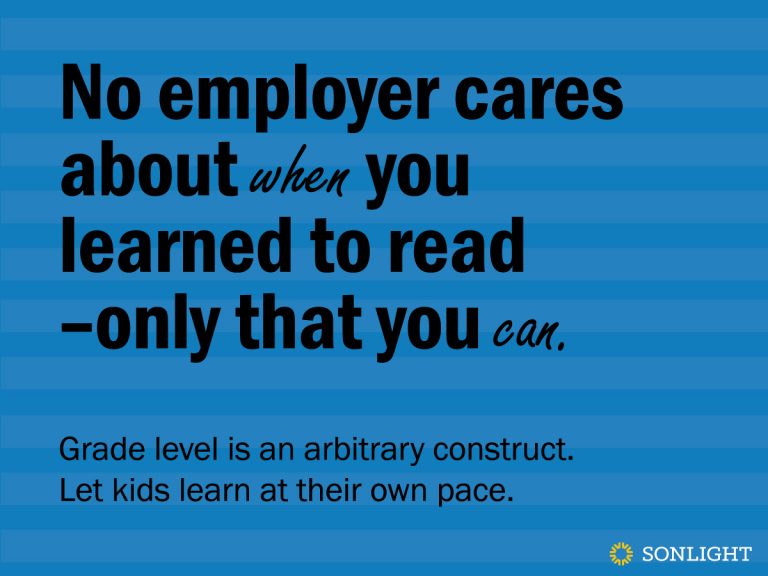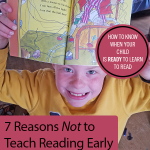
"When my three-and-a-half year old asked to learn to read, I panicked. I had no idea where to start. I talked to one of Sonlight's Advisors, and she got us all set with Kindergarten Language Arts. The Instructor's Guide is so helpful, and I now feel confident about teaching my daughter."
—Jordan B. of Mound, MN
When asked which subject new homeschoolers are most anxious about teaching their children, reading usually tops the list. Most other academic subjects require a child to read, making it feel essential to teach this skill early. When children reach plateaus in their learning, parents may panic, wondering what they are doing wrong or how they can help speed up the process. But teaching reading early doesn’t mean you will have better readers.
1. Reading is a Developmental Process
Parents often compare their children to other young children. They see other children reading and are quick to assume that a child who isn’t reading at the same age has a problem.
But reading is a process created by brain connections not intelligence. Not all children make the same brain connections in the same time or in the same manner. Some children devote a lot of brain power to learning how to read very young and do well.
Other children devote that same brain power to skills they find more important, such as learning to climb, kick, sing, or do math. When their brain is ready to focus on reading, they will make the necessary brain connections.
2. Developmental Processes Can't be Rushed
Reading is a series of developmental skills, not one large skill. It's a lot like walking. A child doesn’t just start walking. There are many milestones before that child ever takes the first step:
- A child builds the muscles in the back and neck to hold up their head.
- They learn to balance their upper bodies by sitting up.
- They use their legs and arms to scoot or crawl.
- They begin trying to stand.
- Once standing, they learn to balance themselves to be able to take a step or two
Parents can help children build those muscles, but they can’t rush the developmental processes that need to take place in the brain for each step. Some children learn how to walk early and others later. But after children have been walking for a year or two, the exact age begins to matter less and less.
Reading is another developmental process including many increments. Trying to rush reading doesn’t make your child read better, any more than trying to make your child walk sooner helps them be a better athlete.
3. Early Reading Instruction May Backfire
Often an attempt to teach reading early backfires, convincing your child that reading is too hard. Wait for your child to be ready for the next stage before pushing on. The less rewarding and enjoyable that reading seems, the less they will want to read.
A variety of studies show students who begin school (and consequently reading) before they are ready have higher levels of dyslexia, speech impediments, low self-esteem, higher anxiety, less motivation to succeed, and higher levels of frustration with or dislike of certain school subjects.
Wait and watch for your child to show developmental signs of readiness before beginning reading instruction. Some signs of being ready to read include:
- pretends to read and write
- shows a desire to learn how to read (like the child pictured at the top of this post!)
- loves listening to and looking at books
- demonstrates print awareness (recognizes that letters represent sounds)
These signs are not a guarantee that a child is ready. Some children love books from birth and enjoy being read to, but aren’t ready to read for years to come.
4. Younger Isn’t Necessarily Better
Despite public schools pushing preschool reading skills, teaching a child to read at that age isn’t endorsed by most child development experts and researchers.
Some children do teach themselves young. You’ll find there are children who read everything and seem to do very well with little instruction. But, if your child isn’t one of those, don’t worry. Your child is normal, too!
The best football players aren’t the ones who hold a football in the delivery room or throw a ball before age one. The best athletes are the ones who practice the hardest and have a natural ability even if they never hold a football until age ten. Here's another example: My husband is a musician who composes, writes, and performs his own music. He didn’t learn how to play his first instrument until he was 18. He didn’t learn his second until 22, or his third until 23. By standards in the music community, he should not be able to play well enough to be a professional musician. Yet, he does play professionally!
It’s hard to watch neighbors bragging about how early their children are learning certain skills in preschool, but by fifth grade, you’ll see that those early reading abilities are no longer important. No one will care anymore whether your child learned to read at 4 or 10. No college application will ever disqualify your child for learning to read later.
Once your child learns to read, no one will care when they learn to read. Only that they can. And that they do.
5. Intelligence is Not Linked to the Age a Child Learns to Read
The age at which a child learns to read does not indicate their intelligence level. Many gifted and advanced children don’t learn until first or second grade, some even later.
Schools are evaluated by reading test scores of their students. Having younger children do well looks good for them when standardized testing scores are tabulated. But the truth is children will learn to read when their brains are ready. Some read very early and others very late.

6. Eye Development Is Crucial
Children develop their distance vision before their close-up vision, so allow your young child to play in wide open spaces as much as possible. Park play equipment, nature exploration, beach-combing, outdoor sports, and backyard shenanigans are all useful in developing a good reader. Eyes mature around age eight.
As their eyes develop, teaching reading becomes easier and easier. Some children will still struggle beyond age eight. Playing outdoors is even more important for these children so they have opportunities to exercise their distance vision.
7. Children Who Learn to Read Later Do Just as Well as Everyone Else
There’s actually no proven benefit to teaching your child to read early. There is research that supports surrounding them with books and reading to them often, but none that supports actually teaching them to read young.
Dr. Sebastian Suggate, a researcher in childhood education in New Zealand, conducted multiple studies into the benefits of teaching children to read young (age 5) or late (age 7). His research shows that around age 10.89, there is no discernible difference between the two groups. The group that learned to read early showed no advantages for having done so.
Children who start school when they are ready tend to show more motivation, improved grades, better leadership skills, and a greater interest in school subjects. Overall, research shows there are benefits to teaching reading later rather than earlier.
If your child is impatiently waiting to start reading and seems to do well, by all means, start. But, if your child is balking at reading lessons and frustrated by the process, it is likely a sign their brain is just not quite ready yet.
Starting early isn’t a prerequisite for excelling:
- Take Rocky Marciano, the famous boxer who started boxing at 20.
- Or consider Julia Child, a famous French chef who didn’t know French cooking until she was 30.
- And, most inspiring of all, think of Grandma Moses, the painter who took up her paintbrush at 78.
If your child isn’t reading by 5 or 6, all is not lost. They’re just beginning their life-long journey of reading a touch later because they’ve been so busy focusing on building other skills first.
Talk to an Advisor who can help you decipher if your child is ready for reading instruction (or remediation) and what program fits best. It's free!










None of my 3 children were early readers, though obviously very smart. When he was 8 my oldest required vision therapy (even though his eyesight was 20/20) because his eye muscles were not fully developed. He did not read fluently or for pleasure until he was in 5th grade, yet went on to win a National Merit Scholarship and a fellowship that paid for his master's degree. Both he and his brother went to a charter high school and earned their A.A. degree a week before graduating from high school. My second son won a 4 year scholarship to FSU.
My daughter didn't choose to go the college route, but is also doing well. Each child develops at his own pace. (BTW, my oldest son still can't spell! Thank goodness for spell check!)
A former Sonlight Homeschool mom
Woot, love this! My youngest was a reluctant reader, and it was so hard to keep myself in check as I let her grow into it in her own time!